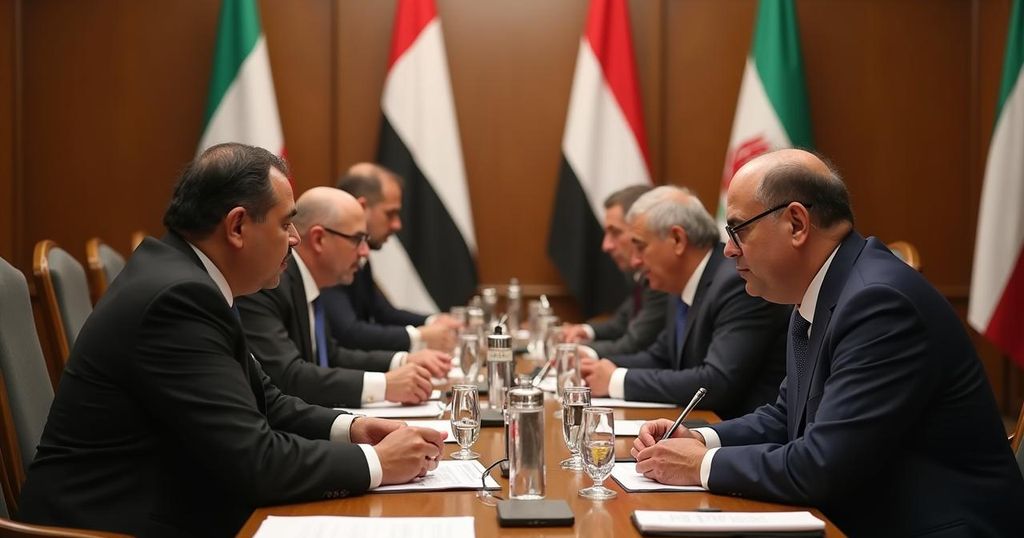Egypt’s Foreign Minister, Badr Abdelatty, and Qatar’s Prime Minister, Sheikh Mohammed bin Abdulrahman Al Thani, met on October 12, 2024, to discuss achieving a ceasefire in Gaza, the situation in Lebanon, and reconciliation efforts between Palestinian factions amid ongoing Israeli aggression. The talks emphasize the need for humanitarian access and regional cooperation.
On October 12, 2024, Egyptian Minister of Foreign Affairs and Immigration, Badr Abdelatty, engaged in a significant dialogue with Sheikh Mohammed bin Abdulrahman Al Thani, the Prime Minister and Minister of Foreign Affairs of Qatar. This conversation was part of ongoing collaborative efforts between Egypt and Qatar concerning the critical developments affecting the Gaza Strip and Lebanon. The discussions predominantly focused on the joint initiatives aimed at securing a ceasefire in Gaza, facilitating the release of hostages, and ensuring unfettered access to humanitarian aid for those in need. Furthermore, the ministers reviewed various Egyptian-led initiatives aimed at fostering Palestinian reconciliation, notably the hosting of delegations from both Fatah and Hamas in Cairo to strategize on promoting the Palestinian national interest during this precarious phase for the Palestinian cause. In addition, the situation in Lebanon was addressed, highlighting the ongoing Israeli offensives. The ministers reaffirmed the significance of achieving a ceasefire and supporting all Lebanese state institutions, particularly the Lebanese army. They reiterated the necessity of implementing UN Resolution 1701, which facilitates the Lebanese army’s deployment in southern Lebanon, and emphasized the urgency of electing a consensus president to fortify Lebanon’s governmental institutions. Minister Abdelatty and his Qatari counterpart also stressed the importance of synchronized regional and international efforts to provide humanitarian, shelter, and medical assistance to the Lebanese populace, notably in light of the displacement of over 1.2 million individuals caused by the ongoing Israeli assaults. They accentuated the need to preserve Lebanon’s unity, sovereignty, and territorial integrity, underscoring the imperative for Israel to withdraw from all Lebanese territories and ensure the safety of UN personnel associated with the UNIFIL force. Furthermore, on October 9, 2024, representatives from the Fatah movement, led by Palestinian President Mahmoud Abbas, and the Islamic group Hamas commenced fresh discussions in Cairo to address ongoing Israeli aggression in Gaza and to bolster national unity. A Hamas official noted that the talks would encompass both political and on-ground developments, aiming at plans for cooperation following the initiation of the Gaza war on October 7, 2023. These dialogues are vital in attempting to bridge the prolonged division that has existed since Hamas took control of Gaza in 2007.
This article discusses the recent diplomatic efforts between Egypt and Qatar amid the ongoing crisis in Gaza and Lebanon. It highlights the collaborative negotiations aimed at achieving a ceasefire in the Gaza Strip, where humanitarian concerns are pressing due to escalating military conflicts. Additionally, it addresses the internal Palestinian political landscape, focusing on reconciliation efforts between Fatah and Hamas, while also examining the broader implications for Lebanon under Israeli pressure. The role of international cooperation in providing humanitarian assistance is also a critical component of these discussions, reflecting the urgency of the situation.
In summary, the talks between Egypt and Qatar reflect a concerted effort to address the urgent humanitarian crises resulting from the ongoing conflicts in Gaza and Lebanon. The focus on achieving a ceasefire, fostering Palestinian unity, and ensuring humanitarian access underscores the gravity of the situation, indicating a potential pathway towards stability in a region facing significant turmoil. The collaborative approach advocated by both ministers serves as a crucial step in addressing not only immediate humanitarian needs but also the political dimensions of the Palestinian plight and the situation in Lebanon.
Original Source: www.egypttoday.com






